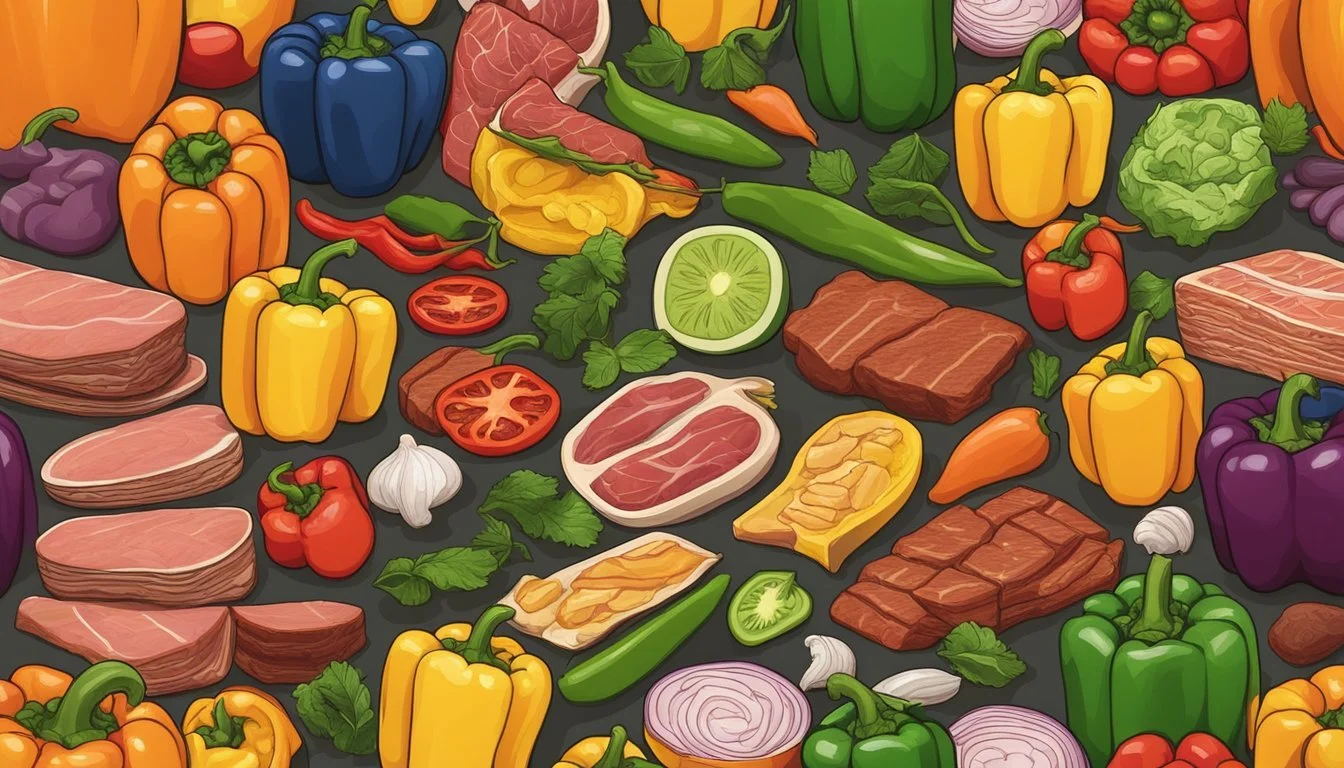Bell Peppers and Carnivore Diet
Exploring Benefits and Compatibility
Bell peppers, known for their vibrant colors and crisp texture, are a staple in many diets around the world. However, the consumption of bell peppers cannot be included on the animal-based Carnivore diet. This diet emphasizes the intake of animal products such as meat, eggs, seafood, and certain dairy items, completely excluding plant-based foods like bell peppers.
The Carnivore diet is rooted in the belief that human health can be optimized by focusing solely on animal-derived nutrients, thereby eliminating potential dietary irritants found in plants. While bell peppers are rich in vitamins and antioxidants beneficial to health, they do not align with the strict guidelines of this diet, which excludes vegetables altogether.
Those considering the Carnivore diet often weigh the benefits of its simplified approach to nutrition against the loss of diverse plant foods. Although bell peppers and other vegetables offer essential nutrients, the Carnivore diet provides a different nutrient profile predominantly centered on animal products, which some proponents argue may better support certain health outcomes.
Fundamentals of the Carnivore Diet
The Carnivore Diet is centered on consuming animal-based products exclusively. This section delves into defining the diet, its core principles, and the benefits and challenges associated with this approach.
Defining Carnivore Diet
The Carnivore Diet is a dietary regimen that involves eating only animal-sourced foods. This includes a variety of meats, such as beef, pork, chicken, and fish. Additionally, it incorporates other animal products like eggs and certain dairy items, such as cheese and butter.
The diet strictly excludes all plant-based foods. This means no vegetables, fruits, grains, legumes, or nuts. The idea is to focus solely on protein and fat from animal sources to meet nutritional needs, potentially mimicking the dietary patterns of early human ancestors.
Core Principles
Animal Products Only: The diet emphasizes only consuming products derived from animals. This includes all types of meat and, in some variations of the diet, dairy products.
High Protein and Fats: The primary sources of nutrition in the Carnivore Diet are protein and fat. This is crucial for energy and muscle maintenance, avoiding carbohydrates almost entirely.
Nutritional Simplicity: By excluding plant foods, the diet simplifies food choices. This can reduce decision fatigue and might make meal planning more straightforward for some individuals.
Ketogenic Tendencies: Due to its high-fat, low-carb nature, many followers of the Carnivore Diet may enter a state of ketosis. This metabolic state is known for using fat as the primary energy source.
Benefits and Challenges
Health Benefits:
Reduced Inflammation: Some people report decreased joint pain and overall inflammation.
Digestive Health: For individuals with issues like IBS, excluding fibrous plant foods can alleviate digestive discomfort.
Weight Loss: The high protein intake can promote satiety, potentially leading to weight loss.
Challenges:
Nutrient Deficiencies: The lack of plant-based nutrients like vitamin C and fiber can be concerning.
Digestive Issues: Transitioning to a meat-only diet can be hard on the digestive system, leading to initial discomfort or constipation.
Monotony: The limited food variety may lead to dietary boredom for some individuals.
By understanding these key aspects, individuals can better evaluate the Carnivore Diet's suitability for their lifestyle and health goals.
Avoid the crowds and shop for vitamin C and fiber online from the comfort of your home!
Nutritional Components of a Carnivore Diet
The Carnivore Diet focuses exclusively on animal-based products, which provide a rich array of proteins, fats, and essential micronutrients. This diet emphasizes animal meats, eggs, fish, and dairy, ensuring a robust intake of critical nutrients.
Protein Sources
Protein is a cornerstone of the Carnivore Diet, with sources such as beef, poultry, pork, lamb, and fish. These meats supply the body with all essential amino acids, fostering muscle growth, repair, and overall body function.
Eggs contribute high-quality protein and important nutrients like choline and biotin. Organ meats (like liver and kidneys) are protein-rich and bring additional benefits, offering concentrated sources of vitamins and minerals.
Fats and Fatty Acids
Animal fats form a pivotal part of the Carnivore Diet. They provide energy and support cellular function. Sources include fatty cuts of meat, butter, ghee, and animal-based oils. Dairy products like cheese, heavy cream, and whole milk also contribute to the fat content of the diet.
Fats supply essential fatty acids like omega-3 and omega-6, vital for brain health and inflammation control. Fish, particularly fatty varieties like salmon and mackerel, are excellent sources of these beneficial fats.
Make your life easier by ordering ghee online; it's just a few clicks away!
Vitamins and Minerals
The Carnivore Diet provides a range of essential vitamins and minerals. Meat and organ meats are rich in B vitamins, iron, zinc, and magnesium. Liver, in particular, is an abundant source of vitamin A, iron, and copper. Dairy products contribute calcium, crucial for bone health.
While vitamin C is commonly associated with plant foods, some animal products like liver also offer small amounts. Eggs provide selenium and vitamin D, supporting immune function and bone health.
Potassium, often found in plant foods, is available in lesser amounts in meats and dairy. Utilizing a diverse range of animal products is key to achieving a balanced intake of these critical nutrients.
Bell Peppers and Plant-Based Foods in a Carnivore Diet
Bell peppers, rich in vitamin C and antioxidants, represent a departure from the strictly animal-based focus of the strict carnivore diet. Integrating or excluding such foods from this diet involves considering the nutritional benefits and dietary philosophies.
The Role of Vegetables
Vegetables generally don't align with the strict carnivore diet, which emphasizes animal products like meat, seafood, and certain dairy items. The diet eliminates plant foods to reduce exposure to plant compounds and carbohydrates, aimed at mimicking ancestral eating patterns.
Bell Peppers' Nutritional Value
Bell peppers contain notable amounts of vitamin C, antioxidants, and other micronutrients. These components can bolster the immune system and provide anti-inflammatory benefits. However, their fiber content and natural sugars may be points of contention for adherents to the carnivore diet, who prioritize zero-carbohydrate intake.
Nutrient Bell Peppers (per 100g) Vitamin C ~127.7 mg Carbohydrates ~6g Fiber ~2g Calories ~31
Incorporating Bell Peppers
Those considering incorporating bell peppers into a carnivore diet may use them sparingly to enhance flavor without significantly increasing carbohydrate intake. Small quantities could be utilized in dishes to benefit from their nutrient content while maintaining the diet's focus. Some lenient variations of the diet might allow such plant foods for their micronutrient and antioxidant benefits.
By balancing nutritional needs with dietary goals, one can make informed decisions about including bell peppers in a carnivore diet.
Lifestyle Considerations
When considering the role of bell peppers in a carnivore diet, it's essential to address various lifestyle aspects like meal planning, social balance, and the different versions of the carnivore diet.
Meal Planning
Planning meals on a carnivore diet can be challenging, especially if bell peppers or other vegetables are part of the discussion. A typical meal might include meats such as beef, pork, or fish. For breakfast, options could be eggs and bacon. Lunch might consist of a steak or chicken breast, and dinner could involve lamb chops or seafood.
Key Points:
Nutrient Absorption: The diet emphasizes animal-based nutrients.
Satiety: High protein and fat content keep individuals full longer.
Body Composition: Many report improvements in muscle mass and weight loss.
Social and Dietary Balance
Maintaining social and dietary balance can be tricky on such a restrictive diet. Social occasions usually involve diverse food options, making adherence to strict carnivore rules difficult. When friends gather for dinner, bell peppers in dishes might tempt someone following the diet.
Tips for Social Situations:
Communicate dietary needs: Inform hosts about dietary restrictions.
Bring your own food: Ensure you have compliant options available.
Flexible Strategies: Some carnivore variations allow occasional plant-based foods.
Carnivore Diet Variations
There are several variations within the carnivore diet, which may or may not include bell peppers. The strict carnivore diet excludes all plant-based foods, focusing solely on animal products. Other forms, like the animal-based carnivore diet, might incorporate limited fruits, honey, and even some vegetables.
Strict Carnivore: No plant-based foods at all.
Animal-Based: Includes some fruits and honey.
Elimination Diet: Starts strict and reintegrates certain foods to identify intolerances.
These variations allow individuals to tailor the diet to their lifestyle, making it more sustainable in the long term.
Health Benefits and Risks
A carnivore diet focuses solely on consuming animal-based foods. While this can lead to certain health benefits, it's crucial to understand the associated risks and how to mitigate them.
Weight Management
Adopting a carnivore diet can influence weight management. Animal-based foods are often high in protein, which can promote a feeling of fullness and reduce overall calorie intake. This may help with weight loss.
Important Points:
High-protein diets can enhance satiety.
Protein helps maintain muscle mass during weight loss.
Excluding carbohydrates can lead to rapid weight reduction initially.
However, relying exclusively on animal products demands careful planning to avoid excessive caloric intake from fats, which might counteract weight loss efforts.
Metabolic Health
The carnivore diet can also impact metabolic health. Animal-based foods generally contain minimal carbohydrates, which can help stabilize blood sugar levels. Individuals with insulin resistance or diabetes might experience improvements.
Key Benefits:
Stable blood sugar levels: Limited carb intake reduces blood sugar spikes.
Improved insulin sensitivity: Lower carbohydrate consumption aids insulin function.
Reduced inflammation: Eliminating plant-based foods might decrease digestive issues.
Balancing nutrient intake is essential to ensure that the benefits on inflammation and metabolic health are maximized without causing nutrient deficiencies.
Potential Risks and How to Mitigate Them
A strict carnivore diet poses certain risks, such as an increased likelihood of heart disease due to high saturated fat intake. Additionally, the exclusion of plant-based foods can lead to nutrient deficiencies.
Notable Risks and Mitigation Strategies:
Heart Health Concerns: High saturated fat levels can elevate cholesterol.
Mitigation: Opt for lean meats and moderate fatty cuts.
Nutritional Deficiencies: Lack of vegetables can result in low intake of fiber, vitamins, and minerals.
Mitigation: Incorporate nutrient-dense organ meats and consider supplementation.
Digestive Issues: Absence of fiber can lead to constipation.
Mitigation: Ensure sufficient hydration and include eggs, which can aid digestion.
Understanding and addressing these risks can help maintain a balanced and health-focused approach to the carnivore diet.
Complementary Foods and Beverages
In a carnivore diet, beverages and snack options can play an essential role. Knowing what to include and exclude ensures compliance without compromising enjoyment.
Beverages on a Carnivore Diet
Water is the primary beverage, critical for hydration. Bone broth is beneficial, providing essential nutrients like collagen and amino acids. Coffee and tea are permitted but should be consumed without sweeteners or milk. For those looking to add flavor without compromising the diet, unsweetened herbal teas are acceptable, offering variety without additional sugars or carbs.
Snacks and Treats
Carnivore-friendly snacks include hard-boiled eggs, which are rich in protein. Cheese and butter can be consumed in moderation. Meat-based options like beef jerky are suitable if they contain no added sugars or preservatives. Some followers of the diet include small amounts of berries for a touch of sweetness, respecting the low-carbohydrate nature of the diet. Avoid plant-based snacks such as nuts and seeds.
Herbs and Spices
Herbs and spices can enhance the flavors of your meals. Salt and pepper are staples. Additionally, garlic powder, onion powder, and paprika can be used generously. Fresh herbs like rosemary, thyme, and parsley add aromatic elements without significant carbs. Spices should be used carefully to avoid blends containing added sugars or fillers.
This approach to complementary foods and beverages helps maintain the principles of a carnivore diet while offering variety and enjoyment.
In-Depth Look at Specific Foods
On the carnivore diet, the primary focus is on animal-based foods, with a strong emphasis on specific types of meat, seafood, eggs, and certain dairy products. Conversely, fruits, vegetables, and plant-based foods are generally excluded.
Red Meat and Poultry
The carnivore diet heavily prioritizes red meat and poultry. Popular choices include beef, steak, ground beef, beef liver, and lamb chops.
Beef: A staple, full of protein and fats necessary for energy.
Pork and Bacon: Commonly consumed for their rich, satisfying flavors.
Poultry: Chicken and turkey provide leaner options, often prepared grilled or baked.
Organ meats like liver are also valued for their nutrient density, offering vitamins and minerals.
Seafood and Fish
Seafood and fish are vital components of the carnivore diet, providing essential omega-3 fatty acids, vitamins, and minerals.
Salmon: Known for high omega-3 content.
Tuna and sardines: Packed with protein and healthy fats.
Other seafood: Shrimp, crab, and oysters add variety and unique nutrients.
These foods are often grilled, steamed, or eaten raw as part of the diet to maintain nutrient integrity.
Dairy and Eggs
Dairy and eggs offer another nutrient-rich category in the carnivore diet.
Hard-boiled eggs: A quick protein source.
Scrambled eggs: Often consumed for breakfast.
Cheese, butter, and heavy cream: Used to enhance flavor and add healthy fats.
While some individuals may tolerate these well, it's important to choose full-fat and low-lactose options for best results.
Fruits and Vegetables Debate
The strictest interpretation of the carnivore diet excludes all fruits and vegetables, which includes items like bell peppers, avocado, and leafy greens.
Proponents argue that plant-based foods add unnecessary carbohydrates and toxins.
Critics highlight the loss of key nutrients found in produce, such as fiber and vitamins.
Some dieters may include small amounts of select fruits like berries or avocado, but bell peppers, broccoli, and zucchini are typically avoided.
This debate remains a contentious aspect of the dietary guidelines.











